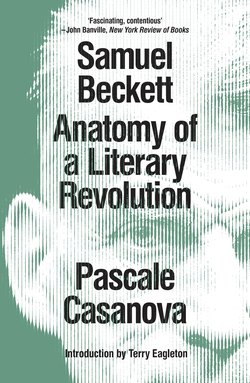Читать книгу Samuel Beckett - Pascale Casanova - Страница 9
На сайте Литреса книга снята с продажи.
Оглавление2
Youth and Genesis
This kind of precise reading nevertheless reduces textual analysis to unravelling a enigma exclusively on the basis of the materials provided, as in detective novels, by the text itself. It seems to vindicate partisans of a pure reading of pure texts who want to believe – like Roman Jakobson analysing Baudelaire’s ‘Les Chats’ – in their interpretative self-sufficiency. As ordinarily practised, internal reading makes it possible to understand the how of a literary text – that is, to dismantle its internal mechanics. But it never poses the question of its very existence (ofwhy it exists rather than nothing); the question of why it exists in this particular form. It thus prevents itself from understanding the ruptures the text originates in, the terms of the implicit debate it is involved in – in short, its specific history. It postulates the a-historical character and inevitability of any text: literature is supposedly like a miracle before which we must bow down and in silence.
We can therefore opt not to stop at a description of the text, but go on to raise the necessarily historical question of ‘why’. ‘Historical inquiry’ is then applied to the oeuvre and the literary configuration that made it possible. It returns to the conditions of its emergence, its genesis. Internal reading is unquestionably much more legitimate when applied to Beckett’s late texts than any other type of text, since they are the most radically autonomous – that is, those to which, on account of Beckett’s novel project, the theory of the autonomy of literature and critical discourse might exceptionally be applied. Even so, in order to understand the formal and aesthetic questions that Beckett posed himself, the way he sought to resolve them, and in order to grasp the stakes and very ‘purity’ of his literary project, its progressive detachment from any external determination, we must retread the path of his attainment of formal, stylistic freedom. And this path is historical.
Contrary to what is asserted by criticism inspired by Blanchot, which has severed him from his history in its entirety, Beckett belonged in the first instance, at least prior to his exile and break (which are likewise the product of his Dublin itinerary), to the Irish literary universe. His oeuvre, it is true, became increasingly autonomous, discovered and asserted its own logic, and broke its direct dependence on the original literary space. But we can only understand the set of decisive choices he made, the process of his aesthetic investigations, on the basis of his position in his original universe. The indices of a paradoxical ‘Irishness’, accepted and asserted by Beckett, are numerous, at least from his definitive settling in Paris – starting with his professed adherence to the Irish philosopher Berkeley’s idealism; and the signs of a perfect knowledge of the specific problems bound up with the Irish literary and political universe provide a gauge of his membership of it, albeit ambivalent and denied.
Much evidence reveals him very hesitant about the idea of being assimilated, as a result of French ignorance, to the zone of English influence. Robert Pinget recounts that with a view to improving his English he had asked Beckett in writing for some addresses in England and had received an immediate reply to the effect ‘that he had no addresses in England but several in Ireland’.1 John Fletcher recalls that Beckett always travelled with a passport issued by the Republic of Ireland.2 And E. M. Cioran, naturally without relating the literary tastes of Beckett, who had a passion for the writings of his compatriot Swift, to a national history, but attributing them to an unexplained affinity between their oeuvres, recounts:
I do not know how we arrived at Swift, even though, on reflection, there was nothing anomalous about the transition, given the lugubrious character of his raillery. Beckett told me that he was reading Gulliver’s Travels and that his favourite part was the ‘country of the Houyhnhnms’, especially the scene where Gulliver is wild with fright and disgust at the approach of a female Yahoo.3
